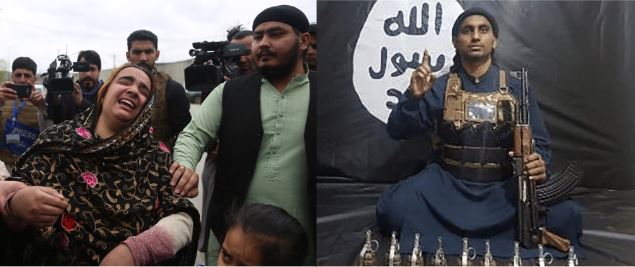In the past, we have heard about radicalised youth in Kerala getting linked to the Islamic State of Iraq and Syria (ISIS), with more than 100 radicalised youths from Kerala tracing links to Syria as early as 2017 and the number would have only grown further. Now, in what corroborates growing radicalism in the state, a Kerala youth was reportedly involved in the Kabul Gurudwara attack in Afghanistan.
This easily is the first case of a radicalised Kerala youth joining a terror attack on foreign soil. Identified as Mohammed Muhsin, the Kannur resident was one of the three suicide attackers involved in the terror attack that resulted in the death of 28 Sikh devotees.
An Islamic State magazine, al Naba, published a picture of the three suicide attackers, and the parents of the Kerala recruit identified him. According to an official, the mother of the radicalised youth also received a Telegram message on her mobile informing her that her son attained “martyrdom” in the Kabul attack.
The Kerala youth involved in the attack joined the IS in Khorasan Province (ISKP)- an organisation that bears links with the Taliban as well as the Pakistan-backed terror group Lashkar-e-Taiba in the year 2018. The Indian agencies are trying to find out if the other attackers involved in the attack too were Indians.
Meanwhile, the Indian intelligence agencies have confirmed that in Kabul Gurudwara attack, India was the real target as the Haqqani Network and the Lashkar-e-Taiba chose to hit Guru Har Rai Gurdwara at Shor Bazaar due to the heavy troop deployment at the Indian Mission. The terror attack code-named Operation Blackstar by the Pakistani intelligence was ordered by Quetta Shura of Taliban at the instance of Pakistani deep State.
The Taliban and Pakistani deep state had twin objectives to achieve with this attack- firstly, getting rid of the minority community that Taliban given its ideology would always consider as some sort of a victory and secondly, getting an Indian national Tian Singh removed in what seems like a case of specific targeting.
Remember, the attack was carried out because the terrorists wanted to target Indian diplomats visiting the Gurudwara and it is very much possible that they saw some kind of a threat to their hegemony in the person that they specifically targeted and removed.
ISKP, which was reportedly allowed to take credit for committing the terror attack that was actually orchestrated by other outfits like the Lashkar e Taiba and Haqqani Network in active collusion with the ISI, issued a statement claiming that the attack was a revenge against Indian actions in Kashmir.
It is clear that the issue of Kashmir was played up in the mind of the Kerala recruit and maybe even the other attackers, whose nationality and identity is still being probed by India’s agencies. But the real motive that the Taliban and Pakistani deep state pushed with this attack was to hamper Indian interests in Afghanistan and to drive out India from the war-scarred country.
India has been supportive of the civilian government in Afghanistan and Taliban that wants to violently topple the Ashraf Ghani regime therefore views Indian interests in the country as a threat.
But the radicalised Kerala youth, being the moron that he must have been simply played into the hands of the ISI and the Taliban by becoming a fidayeen for them and allowing them to use him- an unworthy Indian to attack Indian interests in Afghanistan. Now, it is clear that the role of ISKP and the stated object of avenging India’s actions in Kashmir were both a mere eyewash. After all, why would the ISKP kill Afghan Sikhs, if they had to take revenge for “actions” in Kashmir?
Radicalised minds clouded with Islamist indoctrination in West Asia might hail the Kerala recruit’s actions thinking that he avenged “actions” in Kashmir, actions that these radicalised minds view as objectionable. Even in India, there might be radicalised elements celebrating the attack, and in such circumstances the issue that we are really faced with is the level of radicalism that is picking up in Kerala.
While this is the first case of a Kerala youth being involved in a terror attack of this magnitude and scale, the issue of radicalised youth in Kerala joining global Islamist terror organisations is not something that is anyway surprising for the state. For example, one such radicalised youth hailing from the Malappuram district in Kerala was reportedly killed last year in Afghanistan.
The Kerala-based Popular Front of India (PFI), an affiliate of the banned terror organisation, the Students’ Islamic Movement of India (SIMI) has been quite active in the state for quite some time. There have been several reports of PFI ‘activists’ joining global terror groups, such as ISIS and even Al-Qaeda.
The radical Islamist group PFI has unfortunately thrived in political patronage. And the Pinarayi Vijayan government which left no stone unturned in defiling the Sabarimala shrine has repeatedly turned a blind eye towards the activities of the Islamist organisation.
Kerala must understand the real issues that it is encountered with, and dissing other states over a wrong notion of supremacy due to higher literacy rate won’t really serve the purpose. What the state must also understand is that keeping RSS at bay is no achievement because the swayamsevaks would not radicalise the youth to attack Indian interests in Afghanistan, but several Madrassas, funded by Saudi-backed Salafis, preaching Wahhabism to the Kerala kids do indoctrinate impressionable minds.
Wahhabism, Jihadist ideology and Arabisation are the issues that are forcing Kerala youth into radicalism, while the Communist regime keeps inculcating a false sense of supremacy in Kerala, vis-a-vis other states. The case of a Kerala youth killing Sikh devotees in Afghanistan is just too serious to be played down. The state must recognise what has gone wrong and kickstart the process of intense deradicalisation before it is too late.




























